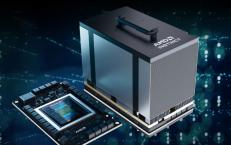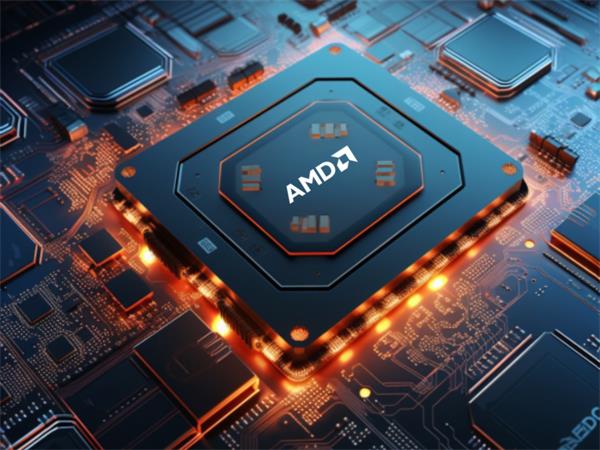AMD tech innovation upgrade, EPYC, Instinct and Radeon PRO series
AMD (Advanced Micro Devices) has recently garnered significant industry attention with the release of a series of new products, showcasing its robust capabilities in data centers, artificial intelligence (AI), and high-performance computing (HPC). The new generation EPYC server processors, Instinct AI accelerators, and Radeon PRO series products not only mark another leap in AMD's technological innovation but also foreshadow the future direction of the data center and AI markets.
New Generation EPYC Processors: A Dual Enhancement of Performance and Energy Efficiency
 AMD's fifth-generation EPYC "Turin" processors offer two core configurations: a 128-core Zen 5 based on a 4nm process and a 192-core Zen 5C based on a 3nm process. These processors aim to compete with Intel's latest Xeon 6 series, such as the Xeon 6700E "Sierra Forest" and Xeon 6900E "Granite Rapids." AMD's EPYC series has always been a versatile choice for AI and HPC, and its powerful performance and energy efficiency have secured a significant position for AMD platforms on the global TOP500 supercomputer rankings.
AMD's fifth-generation EPYC "Turin" processors offer two core configurations: a 128-core Zen 5 based on a 4nm process and a 192-core Zen 5C based on a 3nm process. These processors aim to compete with Intel's latest Xeon 6 series, such as the Xeon 6700E "Sierra Forest" and Xeon 6900E "Granite Rapids." AMD's EPYC series has always been a versatile choice for AI and HPC, and its powerful performance and energy efficiency have secured a significant position for AMD platforms on the global TOP500 supercomputer rankings.
Instinct AI Accelerators: Pushing the Boundaries of AI Computing
AMD has also made significant breakthroughs in AI accelerators. The new generation Instinct MI325X AI accelerator, hailed as the best product in the MI300 series, is equipped with up to 288GB of HBM3E memory, offering a bandwidth of 6 TB/s. This chip boasts higher FP16/FP8 computing capabilities, enabling twice the AI model size per server, positioning it optimally between the MI300 series and the next-generation MI400 series.
AMD's previously released Instinct MI300X and MI300A also demonstrate AMD's strong capabilities in AI acceleration. The MI300X, as a traditional GPU accelerator, surpasses NVIDIA's H100 accelerator card in terms of memory capacity, memory bandwidth, and FP8 and FP16 precision. The MI300A, on the other hand, is a fused accelerator combining a Zen3 CPU and CDNA3 GPU, achieving simplified structure and programming convenience.
AMD Radeon PRO Series Products: Perfect Combination of Cloud and AI/ML
AMD has also released the new Radeon PRO V710, a GPU product based on the RDNA 3 architecture, specifically designed to provide graphics performance for cloud workloads, including cloud gaming, intensive 3D workloads, cloud office, and machine learning. The Radeon PRO V710 has already appeared on Microsoft Azure, offering a private preview, bringing new features to users. The product has the same core size as the consumer-grade Radeon RX 7700 XT, with 54 CUs (i.e., 3456 stream processors), a frequency of 2GHz, 54MB of Infinity Cache, and 28GB of GDDR6 ECC memory.
Radeon PRO V710 instances support hardware virtualization implemented by the PCI Express SR-IOV standard, providing strong isolation between multiple virtual machines running on the same physical GPU and between the host and client environments. Additionally, it supports AV1, HEVC (H.265), and AVC (H.264) encoding and decoding, and adds an AI accelerator for efficient matrix multiplication, as well as support for AMD's open-source ROCm software, providing improved computing performance for machine learning (ML).
AMD's Market Strategy and Future Outlook
AMD's release of new-generation products demonstrates its strength in technological innovation and the forward-thinking nature of its market strategy. With the rapid development of the AI and data center markets, AMD is continuously expanding its product portfolio and strengthening cooperation with industry leaders to drive the improvement of data center professional computing performance.
In conclusion, AMD's newly released EPYC, Instinct, and PRO series products not only provide powerful hardware support for the data center and AI markets but also lay a solid foundation for its future development. As AMD continues to advance in technological innovation and market strategy, we have reason to believe that AMD will achieve even more remarkable achievements in the data center and AI fields.
AMD Introduction
 AMD (Advanced Micro Devices), as a leading global semiconductor company, focuses on the research and development and production of processors (CPUs) and graphics cards (GPUs), as well as providing solutions for data centers and embedded systems. Its main product lines include the Ryzen series processors for PCs and gaming, the EPYC server processors for data centers and high-performance computing, and the Radeon series graphics cards widely popular in gaming, graphic design, video editing, and AI acceleration. In particular, the Ryzen 7 and Ryzen 9 series, along with the EPYC series, have gained a good reputation in the market for their excellent performance and energy efficiency. AMD's brand status is crucial as it not only promotes healthy competition in the semiconductor market but also, through actively embracing open-source technology and collaborating with major operating systems and AI frameworks, provides a wealth of resources and support for global developers. As technology continues to advance, AMD is continuously driving the development of computing technology to provide global users with more efficient, intelligent, and sustainable computing solutions.
AMD (Advanced Micro Devices), as a leading global semiconductor company, focuses on the research and development and production of processors (CPUs) and graphics cards (GPUs), as well as providing solutions for data centers and embedded systems. Its main product lines include the Ryzen series processors for PCs and gaming, the EPYC server processors for data centers and high-performance computing, and the Radeon series graphics cards widely popular in gaming, graphic design, video editing, and AI acceleration. In particular, the Ryzen 7 and Ryzen 9 series, along with the EPYC series, have gained a good reputation in the market for their excellent performance and energy efficiency. AMD's brand status is crucial as it not only promotes healthy competition in the semiconductor market but also, through actively embracing open-source technology and collaborating with major operating systems and AI frameworks, provides a wealth of resources and support for global developers. As technology continues to advance, AMD is continuously driving the development of computing technology to provide global users with more efficient, intelligent, and sustainable computing solutions.
Website: www.conevoelec.com
Email: info@conevoelec.com








